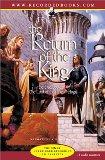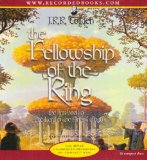 What can one say about J.R.R. Tolkien’s The Return of the King? It’s the long denouement of Tolkien’s epic saga The Lord of the Rings. I hadn’t read it in over 20 years, so I had forgotten just how long the ending is. I think Gollum actually falls into the crack of Mount Doom clutching the Ring, Frodo’s finger still attached, around the middle of the book. The rest of it is setting things to rights and putting a nice bow on the whole story. Of course, my perception may be off because this time I was listening to the books instead of reading the print versions.
What can one say about J.R.R. Tolkien’s The Return of the King? It’s the long denouement of Tolkien’s epic saga The Lord of the Rings. I hadn’t read it in over 20 years, so I had forgotten just how long the ending is. I think Gollum actually falls into the crack of Mount Doom clutching the Ring, Frodo’s finger still attached, around the middle of the book. The rest of it is setting things to rights and putting a nice bow on the whole story. Of course, my perception may be off because this time I was listening to the books instead of reading the print versions.
As with [amazon_link id=”0788789821″ target=”_blank” ]The Hobbit[/amazon_link], [amazon_link id=”B00BR9WMW2″ target=”_blank” ]The Fellowship of the Ring[/amazon_link], and [amazon_link id=”078878983X” target=”_blank” ]The Two Towers[/amazon_link], Rob Inglis narrated The Return of the Ring superbly. His characterization once again impresses, and he handles the scene between Frodo, Sam, and Gollum at Mount Doom particularly well. I can’t think of a finer reader for the series. Nothing about his reading disappointed me.
I noticed a propensity for Tolkien to tell a little more than show in this volume, and I don’t recall noticing this issue the first time I read the books. In particular, the Battle of Pelennor Fields seems to be related mostly second hand and after the fact, which is a little disappointing. All of the action in this battle is shown in the [amazon_link id=”B0037WTD5G” target=”_blank” ]Peter Jackson film of the same title[/amazon_link], so perhaps that interpretation interfered with my memory.
One of the ways in which I feel Jackson erred with the movies was to give the Shire the short shrift. It’s a lovely country, and Tolkien brings it to vivid life in his books, but Jackson omits the entire section of the novel in which the Scouring of the Shire sets the hobbits free from the yoke of the wizard Saruman and his band of ruffians, and in which Merry, Pippin, and Sam become heroes in the Shire (Frodo’s role in saving Middle Earth is largely overlooked at home—the great ones are never really appreciated at home).
At the end of the film version of The Return of the King, there is a scene which always makes me cry when I watch it. Frodo, Sam, Pippin, and Merry, are bowing to Aragorn, and he says, “My friends, you bow to no one.” And then he bows to them. It’s just such a wonderful acknowledgement of everything they did to save the entire world, and the fact that the king humbles himself before these little folks that people forget about (Treebeard himself needs to add them to the list of the world’s creatures)—it’s just an amazing moment. I didn’t remember it happened in the book, but it does (sort of, words and things are changed), and it’s even grander.
I have to admit my favorite character for years was Gandalf, but as time has worn on, I have come to appreciate Samwise Gamgee, and I think he’s my favorite now. He is the steadfast, loyal friend—even as Frodo begins to succumb to the Ring, Sam remains by his side. His sadness when Frodo departs for the Grey Havens is pitiful. And he is the guy who winds up getting married and having a bunch of little hairy-toed hobbit babies. I just love him. I know a lot of Tolkien’s fans go in more for the elves, but I have to say the hobbits are my favorite.
Incidentally, I made a soap called Hobbit’s Garden that smells like apples, oak, English ivy, and rain. It’s available from my Etsy store, where you can find some other nice soaps I made as well. I have one bar available to ship right now, and the other batch I made will be ready July 6.
It feels almost sacrilegious to do so, but I am knocking half a star off my rating for this book for the excess of telling versus showing, but I am of the opinion that the series should be taken as a whole, and if so, then it’s a five-star read all the way.
Rating:






